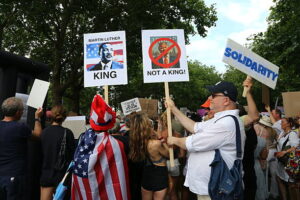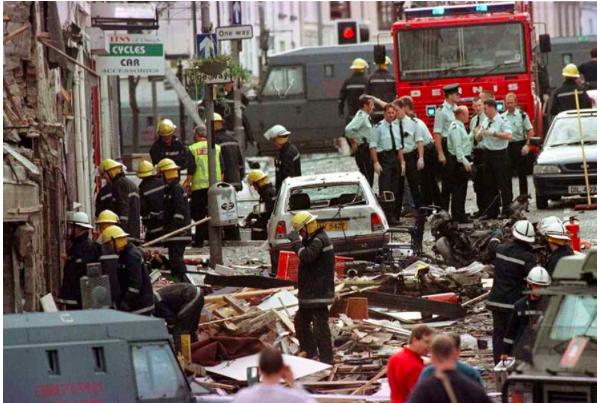The “Troubles”
The three decades-long terror and violence from the late 1960s to 1998 often called “the troubles” has traumatized several generations with the intense level of brutality. This conflict between mainly Protestant unionists and mainly Catholic nationalists was characterized by violence and aggression perpetrated by the numerous paramilitary groups such as the Irish Republican Army (IRA), guerrilla tactics, ideological clashes, and the notorious “Bloody Sunday” where British soldiers shot fires at unarmed civilian protesters in a civil right demonstration killing 26 of them and injuring many others in 1972. According to the CAIN Archive’s collection on Conflict and Politics in Northern Ireland by the Ulster University, 3.720 people were killed. Almost half of the victims were under 25 years old. Approximately 47.541 people were injured. Almost half of the deaths were civilians. International community’s impact and the support of its influential characters was decisive during the Troubles. The Clinton and Reagon administrations from the US, South Africa’s Cyril Ramaphosa, Finland’s Martti Ahtisaari, and Canada’s John de Chastelain were some of the actors who have contributed to negotiate peace. The collective efforts to end the terror on the Island led to the Good Friday Agreement on April 10th 1998. Political scientists believe that today it is significant for the international community and regional partners such as the EU and NATO to become parties involved in this issue to ensure the stability of the region.
The New IRA Movement as a fraction of the IRA
The Irish Republican Army as a republican paramilitary group was founded by militants aiming to gain independence from the UK by armed force in 1919 and formed several fractions throughout its history. They were the prominent group leading a guerrilla war against the British forces. The group was believed to reach foreign assistance in terms of financial and military aid, materials and training from other groups of similar nature such as Colombia’s FARC movement as well as Libya ruled by the late dictator Gaddafi and the Soviets.
Photo credit: Image: Getty Images/AFP/P. Faith
In July 2012 the IRA movement rebranded itself when the New Irish Republican Army (the New IRA) (another division of the republican paramilitary groups) was founded. The New IRA is a continuation of the Real Irish Republican Army which was created in 1997 following a split in the Provisional IRA. It is also IRA affiliated with a mix of other paramilitary groups like Republican Action Against Drugs. The US Department of State amended the name of the Real IRA as the New Irish Republican Army with a media note in June 2023 by its Amendment of the Terrorist Designations. The New IRA is one of the four main dissident republican groups in Northern Ireland which MI5 recognizes. Their main opponents are usually the Police Service of Northern Ireland (PSNI) and the British Army. The group is believed to be responsible for the attacks on PSNI officers and the perpetrators of criminal activities like smuggling, extortion, shootings, and bomb attacks. In April 2023, they tried to sabotage the official state visit of Joe Biden to mark the anniversary of the Good Friday Agreement with a bomb plot but it was prevented.
The Good Friday Agreement: When is the deadline?
Taoiseach Bertie Ahern, George Mitchell, Tony Blair, 1998 Photo Credit: DAN CHUNG / POOL / AFP
Following its signing between Taoiseach Bertie Ahern representing Northern Ireland and Tony Blair as the UK Prime Minister in April 1998 by the broker of US Senator George Mitchell. In May 1998, the Agreement was voted by two referendums in both North and South of Ireland. 71% of those living in Northern Ireland and 94% of those in Ireland voted “Yes”. The Agreement was revolutionary and a concrete step to secure peace through the acknowledgment of people’s identity in Northern Ireland as “Irish, British, or both”. Thanks to the Good Friday Agreement which was followed by the Downing Street Declaration in 1993, the violence has been replaced by the political tools. The Agreement has three sections: The status of Northern Ireland within the UK, the North-South dimension desiring for mutual “exchange of information” and “cooperation” between Northern Ireland and the Irish Republic, and the East-West dimension highlighting the bilateral ties between the UK and Ireland as the “co-guarantors” of this Agreement.
It recognises the fact that individuals and communities may have different aspirations for the future of the island being all legitimate as long as they are carried out peacefully. The Agreement declares that Northern Ireland is part of the United Kingdom and this fact can only be changed through a referendum if the majority in Northern Ireland decides to do so. Analysts highlight the importance of this topic for the sustainability of the Agreement. They scrutinize the deadline of the Agreement arguing that the public may mobilize to gain independence. The referendum is the key to moving towards this way raising questions about the possible amendments or the withdrawal of the Agreement. However, there are several factors for the survivability of the Agreement both on behalf of it and against it.
Civil rights protesters in January 1972 Photo Credit: Robert White
Armed groups agreed to dispose of their weapons following the agreement. The IRA announced several ceasefires in 1992, 1994, and 1997 but none of them granted a long-term peace process. Following the agreement; the IRA, the Irish National Army, the Real IRA and its opponent side Ulster Defence Association, the Ulster Resistance, and other paramilitary groups started to self-dissolution and disarmament. That’s why the Agreement still functions as a cohesive element granting the fragile and long-fought de facto peace. Plus, many communities on the Island still struggle with the long-term consequences of this bloody conflict and suffer from mental health challenges such as Post Traumatic Stress Disorder (PTSD). The decades-long influence of paramilitary organizations and the wounds of the past is an element making people unwilling to adopt a new system by turning a new page and changing the status quo. Though having a slight effect, people favoring either amending or ceasing the Agreement are also attempting to do so because of past scars. When those who were involved in violence during the “Troubles” were released from prison following the Agreement, it created uneasiness among the families of victims. Not entirely playing a major role, it still represents a group of people and is likely to be reflected in future referendums.
UK Prime Minister Rishi Sunak in the House of Commons, October 26, 2022 Photo Credit: Jessica Taylor / UK Parliament via AP
The Power Sharing System
Today’s political system in Northern Ireland is highly delicate. The key factor of its imperfectly functioning mechanism is devolution since 1999 when it took effect. It means that Northern Ireland has limited powers relating to its governance. These powers are transferred from the Westminster government in London. The decentralized system also enables the British government to transmit strictly defined powers to elected bodies all across Cardiff-Wales and Edinburgh-Scotland. This system was implemented in Belfast in 1998 following the Good Friday Agreement. Westminster’s government is responsible for policy concerning England as well as overall policy in defense and national security, foreign policy, immigration, and tax in the UK. The Northern Ireland Assembly which sits in Belfast on the other hand has control over policy areas such as health, education, agriculture, justice, policing, local government, culture, and sport. The Assembly with its 90 elected members represents nationalists, unionists, or other in a power-sharing agreement between nationalists and unionists.
“No hard border” poster in Bridgend in 2019 Photo Credit: Phil Noble/Reuters
Northern Ireland amid growing calls for independence
The Northern Ireland question evolves around several approaches. The Irish separatism from the UK can be summarized into two theories: the Irish unification with the Irish Republic or the Ulster nationalism envisaging an independent sovereign state of Northern Ireland. However, today’s public calls for independence from the UK does not simply rely on these approaches or the bipolar rivalry between the unionist and separatists which was historically inherited. Instead, the public demand for an independent Northern Ireland tends to be shaped by the new generation and their concerns. According to the Guardian, more than 600,000 people have been born in Northern Ireland since the Good Friday Agreement. Statistics indicate that the new generation is more likely to vote for a united Ireland and more likely to identify as Irish or Northern Irish. Recent surveys from Northern Ireland Life and Times demonstrate that 45 percent of respondents between 18 to 24 years old identified as more Irish than British. Only 15% of them identified as unionists. Plus, 41% of respondents over 65 years old identified as more British than Irish while 43% of them identified as unionists. In short, today’s independence movement gains its momentum from the expectations of the youth on topics like climate justice, LGBTQIA+ community rights, feminism, combatting racism, mental health, green transition, and economic problems. It is no longer a question religious tensions or titles as unionists, loyalists, nationalists or separatists.
The Child Custody of UK’s Divorce from the EU: The Northern Ireland
This delicate system got its share from Brexit as Northern Ireland became the only part of the UK to have a land border with an EU country which is the Republic of Ireland in the post-Brexit universe. This fact brought what is referred to as “hard borders” which is not what the population of Northern Ireland was content about. The Brexit required checks on goods being transported between the UK and the EU’s markets such as the Irish Republic. It immensely created uneasiness among the traders as well as the public who has voted to remain within the EU by 55.8 percent of the total 789 thousand valid votes of its 1.260.000 electorates. The Northern Ireland Protocol was introduced between the UK and the EU to ensure that the goods comply with the EU’s strict rules and regulations when they arrive in Northern Ireland from the UK mainland.
Photo Credit: John Campbell/BBC
The EU as a single market requires checks leading to time-consuming paperwork and long queues. In February this year, the UK and the EU signed a new deal, the Windsor Agreement, to adjust the protocol aiming to reduce the number of border checks on goods arriving in Northern Ireland. It was followed by further attempts such as putting “not for EU labels” on goods to indicate the destination of the products.
Photo Credit: BBC NEws
Border checks are a sensitive issue for Northern Ireland because of its troubled political history. Many circles have approached the matter of introducing security cameras or border posts during checks on incoming and outgoing goods cautiously as it could trigger past traumas of the dark periods of history and increase instability. The latest solution for the border checks was the “green lane” and “red lane” formula where the initial is for the goods which are destined only for Northern Ireland while the latter is for the goods which could pass beyond the Northern Ireland border and reach the Irish Republic and other EU countries.
This plan enables to avoid unnecessary border checks of the goods that would remain in Northern Ireland. There were mixed reactions among the political figures and parties towards the plan in Northern Ireland as the nationalist Sinn Fein party supported it while the Democratic Unionist Party claimed it separated the country from the mainland UK.
UK’s Bid for Rwanda vs UK Supreme Court
The UK’s attempts to relocate asylum seekers to Rwanda, known as the “Rwanda Plan”, as part of their strict immigration policy has also had consequential effects on the sustainability of the Good Friday Agreement. Despite the unfavorable decision on 15 November 2023 declaring the proposed plan as unlawful, Rishi Sunak vows to challenge the decision of the UK’s Supreme Court despite the unfavorable decision on 15 November 2023 declaring the proposed plan as unlawful. The conservative government members included the newly appointed Foreign Secretary David Cameron, who had vanished after the Brexit humiliation until recently, and the ex-Home Secretary Suella Braverman who lost her post after the unexpected cabinet reshuffle.
Former British Home Secretary Priti Patel and Rwandan Minister Vincent Biruta in Kigali Rwanda in April 2022 Photo credit: 2022 Simon Wohlfahrt/AFP via Getty Images
The “relocation” of asylum seekers, the “refoulement” procedure is prohibited by international law via conventions and treaties including the European Convention on Human Rights (ECHR). The emphasis lies on the fact that the ECHR is integrated into the Good Friday Agreement thus paving the way for question marks on the possible breaches of the agreement if the UK decides to withdraw from the ECHR which looks not unlikely. It is believed that the UK’s attempts to undermine the ECHR could further risk the Agreement which is the backbone of the status quo in the island. According to the New York Times, the scrutiny over the survivability of the Agreement is also being monitored by the White House given that US President Joe Biden who has Irish roots has a deep commitment to the Irish question despite having a lot on his plate with other topics of high volatility such as the war in Ukraine, the Middle East, the Indopacific and US-Chinese bilateral ties.
Protesters rallying for Scottish Independence in 2023 Photo Credit: Robert Perry/EPA via Shutterstock
The Butterfly Effect
UK could risk facing another separation from Scotland. The country was scheduled to hold a new referendum to gain independence on 19 October 2023 as the former First Minister Nicola Sturgeon advocated a decade after the first referendum. However, the call was hindered by the British Supreme Court ruling that Scotland could not hold another referendum without Westminster’s consent. Referring to a new referendum as “illegal”, it increased the tensions between Edinburgh and London. The ties were already strained by Westminster’s controversial move to bloc the Gender Recognition Bill. The Bill was set to simplify the already demanding process of acquiring a new gender by reducing the minimum age to apply for a Gender Recognition Certificate from 18 to 16. It also aimed to draw out the necessity to prove the two-year period of living in the desired gender with an obligation for medical diagnosis. The Bill which could serve the interest of the LGBTQIA+ community faced a huge backlash from the Conservative government on Downing Street as well as the British Parliament as the letter has the right to veto due to the devolution system.
Challenging Times for the UK?
The United Kingdom may not last “united” forever after all as the signals coming from the countries it comprises indicate discontent as the devolution system gives limited space and means to them regarding their internal affairs and future existence. Experts agree on the fact that such calls for independence coming from the public in Northern Ireland or beyond could pose a threat to the UK, not entirely but politically. Some of them suggest that these calls should not be ignored while others claim that the de facto which is in place for Northern Ireland functions despite its imperfections and the growing desire for autonomy from the UK as there has been no concrete alternative or mobilization.
Photo Credit: Ray Collins / Getty Images










